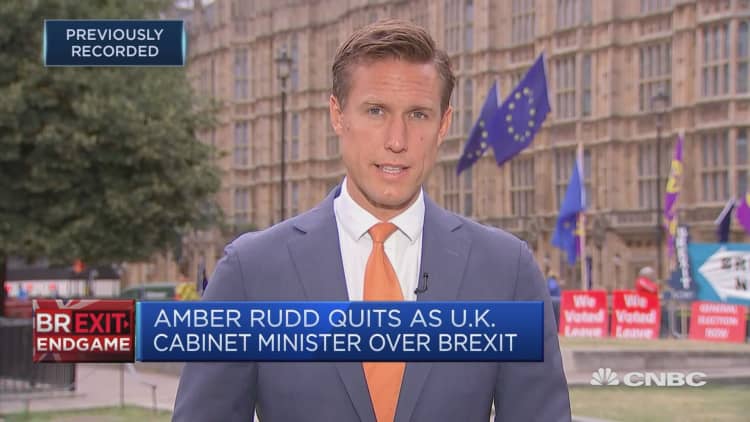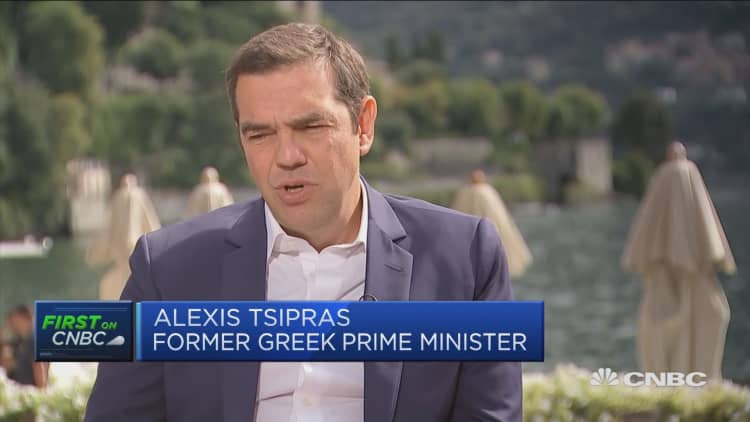U.K. Prime Minister Boris Johnson's office has confirmed the British Parliament will be suspended for the next five weeks starting Monday, after Johnson visited his counterpart in Dublin to discuss solutions to a problem that bedevilled his predecessor Theresa May: how to reconcile an open border between Ireland and the UK, while allowing Britain to strike independent trade deals in the future.
Johnson's government had earlier received Queen Elizabeth's approval for the parliamentary suspension, in what critics insisted was a bid to prevent lawmakers from limiting the British leader's room to maneuver ahead of the current Brexit deadline of Oct. 31.
When opposition legislators returned from their summer break last Tuesday, they responded forcefully to this unprecedented suspension plan. A cross-party coalition of Johnson's political opponents moved swiftly to take control of the parliamentary schedule and then passed legislation that seeks to prevent the prime minister from leading the U.K. out of the European Union without a negotiated exit agreement, and which will be signed into the statute books today.
The apparent lack of control from Johnson has led some currency speculators to assume that a "hard" or "no deal" Brexit can be avoided. Sterling rose more than half a percent Monday, although it gave up some gains toward the end of the European trading session.

A vast majority of economists, corporate executives and investors say that such a "no deal" Brexit would negatively impact the U.K. even more than EU, by disrupting trade flows, business relationships and political trust between the two sides.
Nevertheless, members of Johnson's party that joined last week's cross-party legislative effort to block a so-called "No Deal" were expelled from the Conservative parliamentary ranks, and since that watershed moment two senior members of Johnson's government — one of them his younger brother, Jo — have very publicly resigned their ministerial positions and stepped down as Conservative lawmakers.
Government lack of control
The prime minister has consequently lost his governing majority in the Parliament's lower chamber, known as the House of Commons, and continues to assail opposition lawmakers who he insists have destroyed his government's negotiating leverage with European Union leaders that might avoid the need for a contentious insurance policy known as the Irish backstop.
The backstop formed part of Theresa May's deal with Brussels, and was designed to protect the continued openness of the border between the Republic of Ireland in the south and the separate nation, Northern Ireland, that forms part of the United Kingdom.

The European Union's rules that are designed to protect the integrity of its single market do not allow for goods and services to be easily bought and sold into its territory without a free trade agreement. The regulatory requirements contained in those kinds of agreements can make it difficult for a third country like the U.K., under that regime, to operate the kind of fully independent trade policy that the current British leader considers a crucial consequence of Brexit.
For that, the U.K. would typically need goods to be checked at the EU's border, but Johnson in Dublin repeated that this was not an acceptable consequence, since it would undermine the open border engendered by a 1997 peace deal that heralded the end of ongoing violence in the region.
"The U.K. will never, ever institute checks at the border, and I hope our friends in the EU would say the same," Johnson told his counterpart Leo Varadkar in Dublin.
His critics have said that his government has failed to provide specific alternatives to the so-called Irish backstop in the weeks since he took office. Standing outside the Irish leader's residence Farmleigh House, Johnson said he must remain vague about the particulars.
"There are an abundance of proposals that we have, but I don't think it's entirely reasonable to share them with you today," he told assembled journalists.
That lack of detail was cited by former minister Amber Rudd as a reason for her resignation over the weekend.
"I have not seen enough work going into to actually trying to get a deal," she told the BBC. When she asked Johnson's office what the plan was to reach a fresh deal with Ireland, she said she was sent just a "one page summary."
Varadkar too insisted that the lack of concrete proposals was concerning and would not lead to progress on the Irish backstop that is enshrined in the current withdrawal agreement.
"What we cannot do, and will not do," he told Johnson, "is replace a legal guarantee with a promise."

Tonight members of Parliament will likely reject a second appeal from Johnson to hold a general election next month, a move that he insists is the best option to resolve the current impasse.
After that vote concludes, Parliament will shutter until mid October, though some lawmakers say they remain concerned that Johnson's government may seek to circumvent - or even ignore - the new legislation that demands the prime minister ask the European Union for an extension to the Oct. 31 deadline.
'Rather die in a ditch'
One of the architects of the new law, Hilary Benn, told CNBC it was "very worrying" that Johnson would ignore the Parliament's legal requirements, and that there should be "no debate whatsoever" about its implementation.
Johnson has repeatedly said he would not request an extension from the European Union, and would rather "die in a ditch" than do so.
In light of that assertion, and yet without the power to call an election that might give him a fresh parliamentary majority, Johnson's options have grown limited. That may explain his trip to Dublin to try and renew attempts at a fresh Brexit deal.
Alternatively, says Benn, "the only way to square the circle is if he's no longer prime minister."

